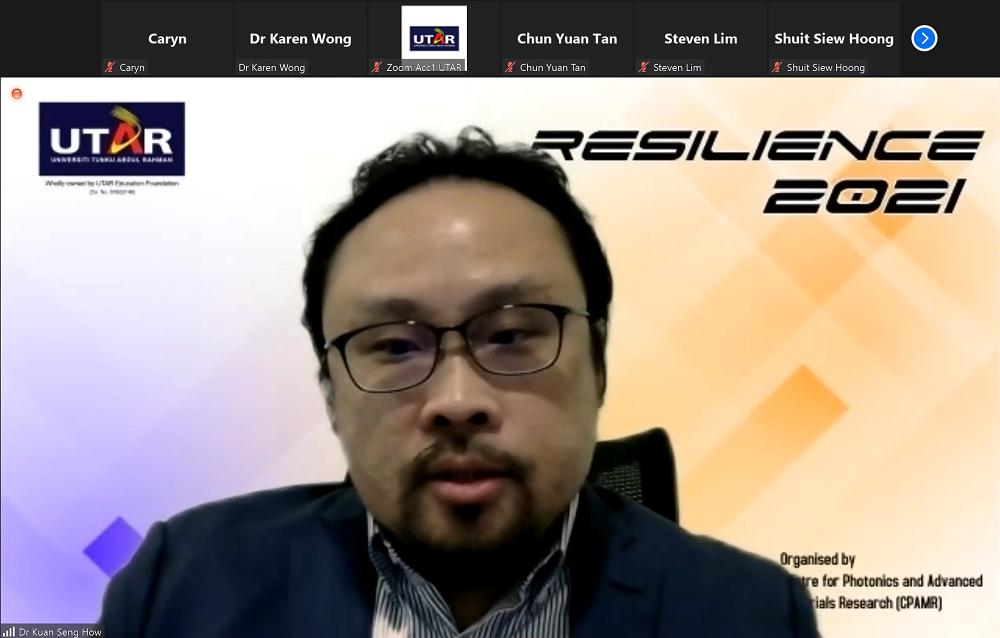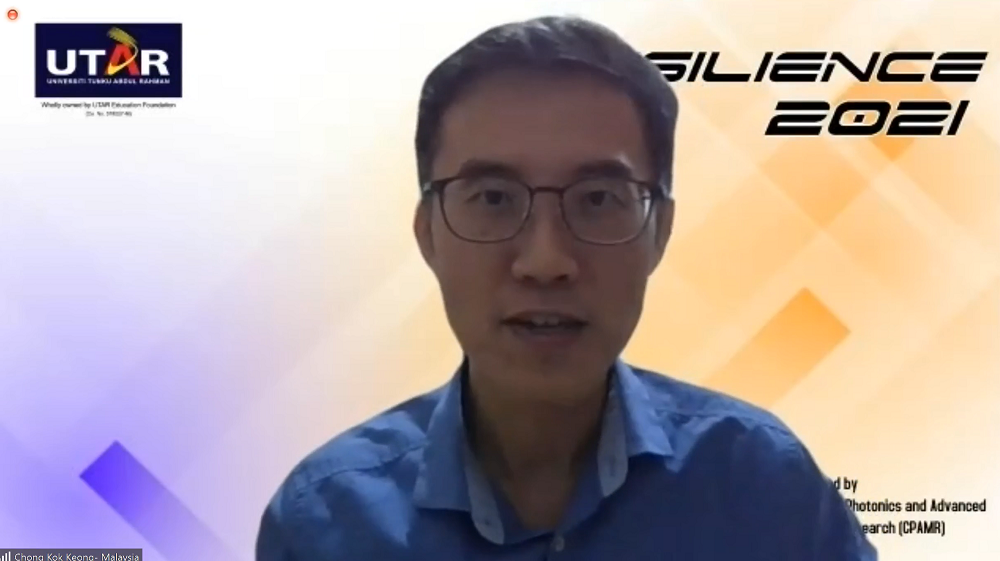
![]()
.png)
Prof Yow (top row, far left) with the speakers, and organising committee
UTAR
Centre for Photonics and Advanced Materials Research (CPAMR) organised
a two-day virtual symposium titled “International Symposium on Resilience
2021: Research Directions and Job Prospects in Engineering and Science after
Covid” on 17 November 2021 via Zoom. The symposium saw about 100
participants from four continents around the world namely, North America,
South America, Europe and Asia, and six countries which were Canada, Sweden,
Malaysia, Thailand, China and Chile.
The international symposium aimed at promoting the adaptation efforts and
resilience of research directions and job prospects in engineering and
science during the Covid-19 pandemic. The symposium also aimed to stimulate
discussion and potential collaboration between universities, funding
agencies and the industry on academic research in engineering. Moderating
the symposium were Lee Kong Chian Faculty of Engineering and Science (LKC
FES) Ts Dr Wong Mee Chu and CPAMR Chairperson Dr Steven Lim.
.png)
Prof Yow delivering his speech during the symposium
UTAR Vice President for Internationalisation and Academic Development Ir
Prof Dr Yow Ho Kwang graced the symposium and said, “The Covid-19 pandemic
introduced an unprecedented number of uncertainties across many aspects in
day to day living from battling spreading of infections and health risk and
social economic challenges, lessening job opportunities and increasing
reliance on digitisation and processes that impact smaller businesses. With
the current focus on post-pandemic business recovery, e-commerce activities,
retraining of staff, redeployment of resources and reconnecting lost
business contacts, how can engineering and science contribute to the
post-pandemic era of future developments, business and environmental and
sustainability? We need to train our graduates to be more resilient and
build a resilient mindset to prepare them to navigate future challenges.
This symposium serves as a platform for the industry and university to come
together and brainstorm and interact for stimulative discussions for a
positive way forward into the next decade. We are honoured to have the
experts and academics to share their expertise and research findings with
the participants. We look forward to an educational and insightful
experience at the symposium.”

Dr Kuan welcoming the participants
Symposium Chairman Dr Kuan Seng How said, “The next decade ahead of us will
be different than what we already know. Drastic changes are taking place in
the world we live in, how we work, and how the economy is structured. The
Covid-19 pandemic impacted society and the trends of low wages and high
living costs have accelerated. Under these challenging times, one trait
stands out amid big changes we’re going through and it is the ability to
endure and thrive under challenging times. This trait is otherwise known as
resilience. I hope the participants will learn from the experts to confront
the new reality and the new normal that we live in today,” as he welcomed
the participants.
Speaking on the first day were LKC FES Prof Dr Chong Kok Keong with his
presentation titled “New working environment in the Post COVID-19 pandemic”;
McGill University, Canada Dr Alessandro Navarra and Dr Elie Abou-Jaoude with
their presentation titled “A new integral discourse in mining towards global
transformation and people power”; Southern University of Science and
Technology, China Dr Ho Chun Loong with his presentation titled
“Augmentation of teaching methods in SUSTech during the COVID-19 pandemic”;
Universidad de Antofagasta, Chile Dr Luis A. Cisternas with his presentation
titled “Impact of COVID-19 on research and teaching in mineral processing at
the University of Antofagasta, Chile” and Luleå University of Technology,
Sweden Dr Yousef Ghorbani with his presentation titled “COVID-19 Pandemic
significances for higher education in Sweden: Challenges and possible future
opportunities”.
SEGi University Dr Shamini Janasekaran started the day-two symposium with
her presentation titled “Fuzzy Logic prediction for research work to reduce
laboratory experiments and its beneficial impact during pandemic” followed
by King Mongkut’s University of Technology North Bangkok, Thailand Dr
Chantaraporn Phalakornkule with her presentation titled “Development of
medical oxygen generators for high-flow oxygen delivery with IoT for remote
control”; Taylor’s University Dr Jesrina Ann Xavier presented on “Aiding
cancer patients through Design Thinking: A COVID-19 case study”; Universiti
Kebangsaan Malaysia Dr Lam Su Datt presented on “Post-COVID + AlphaFold —>
an exciting new era for Structural Biology”; Universiti Kebangsaan Malaysia
Dr Sylvia Chieng presented on “Research in tropical diseases: What can we
learn from the pandemic?” and Southern University of Science and Technology,
China Dr Chen Jun presented on “COVID-19: a perspective of microbiome
research”.

.png)
.png)
.png)
.png)
.png)
.png)
.png)
.png)
.png)
.png)
.png)
Clockwise from top right: Dr Alessandro Navarra, Dr Ho Chun Loong, Dr Yousef
Ghorbani, Dr Chantaraporn Phalakornkule, Dr Lam Su Datt, Dr Chen Jun, Dr
Sylvia Chieng, Dr Jesrina Ann Xavier, Dr Shamini Janasekaran, Dr Luis A.
Cisternas, Dr Elie Abou-Jaoude and Prof Chong during their presentation
The other symposium organising committees were Ts Dr Shuit Siew Hoong, Dr
Thiam Hui San, Dr Sylvia Chieng, Ir Dr Amares Singh, Ir Dr Carine Ng Tan
Ching and Tan Chun Yuan.
Wholly owned by UTAR Education Foundation (200201010564(578227-M)) LEGAL STATEMENT TERM OF USAGE PRIVACY NOTICE